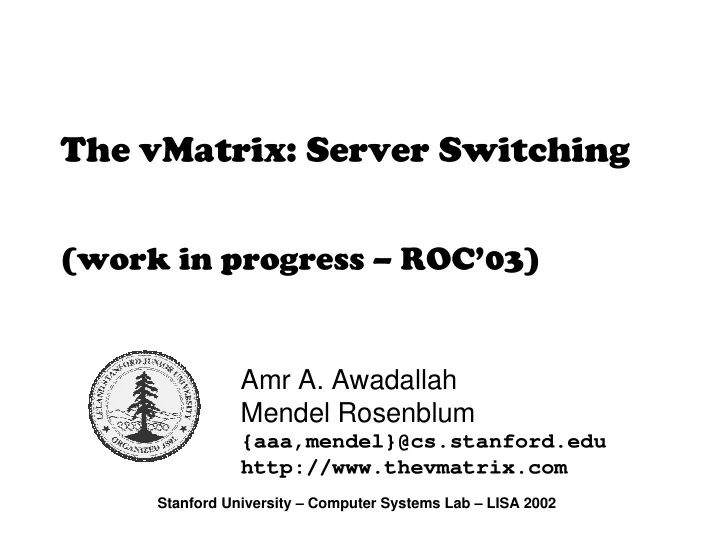

The vMatrix: Server Switching (work in progress – ROC’03) Amr A. Awadallah Mendel Rosenblum {aaa,mendel}@cs.stanford.edu http://www.thevmatrix.com Stanford University – Computer Systems Lab – LISA 2002
Static Servers (ala Circuit Switching) FINANCE SPORTS Load Balancer Stanford University – Computer Systems Lab – LISA 2002
Server Switching (ala Packet Switching) FINANCE & SPORTS vMatrix Oracle Load Balancer Stanford University – Computer Systems Lab – LISA 2002
Server Drop (ala Packet Drop) FINANCE & SPORTS vMatrix Oracle Load Balancer Stanford University – Computer Systems Lab – LISA 2002
Problem with moving services • Software Dependencies • Hardware Dependencies • People Dependencies Stanford University – Computer Systems Lab – LISA 2002
What is The vMatrix? Stanford University – Computer Systems Lab – LISA 2002
Virtual Machine Monitors Oracle, IIS MySQL, Apache OS1: Windows 2000 OS2: Linux Virtual Machine 1: Virtual Machine 2: vCPU, vMem, vDisk, vNet vCPU, vMem, vDisk, vNet Virtual Machine Monitor Real Machine (CPU, Memory, Disks, Network) Stanford University – Computer Systems Lab – LISA 2002
Advantages • Efficient Resource Utilization • Backward Compatibility • On-Demand Spike Absorption • Faster Recovery Disadvantage • VM files are very large (order of gigabytes)! • VM Software is not free ☺ Stanford University – Computer Systems Lab – LISA 2002
Lifecycle of a server VM 1. A large number of virtual servers are stored as dormant files a SAN Hibernation Nest or Netapps 2. A number of virtual servers are Loading Chambers activated in a shared RM so that developers & system admins can upgrade, debug, or patch them. 3. A virtual server is activated on a Instantiated dedicated RM and exposed to live load. 4. A virtual server malfunctions Disposed and is thrown away. Stanford University – Computer Systems Lab – LISA 2002
The Matrix Farts Stanford University – Computer Systems Lab – LISA 2002
Recommend
More recommend